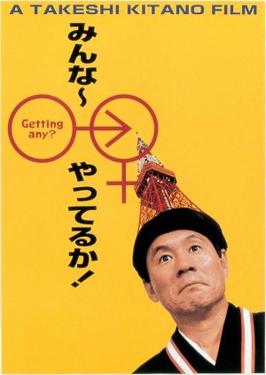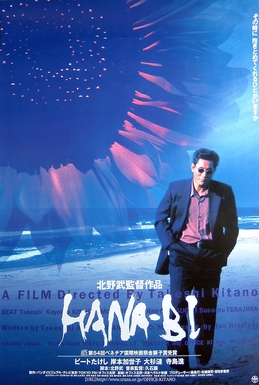
Takeshi Kitano, also known as Beat Takeshi in Japan, is a Japanese comedian, actor, and filmmaker. While he is known primarily as a comedian and TV host in his native Japan, he is better known abroad for his work as a filmmaker and actor as well as TV host.

Getting Any? is a 1995 Japanese film, written, directed, edited, and starring Takeshi Kitano. Yatteru (やってる) is the colloquial form for yatteiru (やっている), yatteru coming from the Japanese verb yaru, which is an informal word meaning 'to do', and has become slang for sexual intercourse. The film is a sex comedy. It showed Beat Takeshi, originally a very popular manzai performer, returning to his comedic roots. The movie features an Airplane!-like assemblage of comedic scenes centering on a Walter Mitty-type character whose obsession is to have sex.

Kids Return is a 1996 Japanese film written, edited and directed by Takeshi Kitano. The film was made directly after Kitano recovered from a motorcycle wreck that left one side of his body paralyzed. After undergoing extensive surgery and physical therapy, he quickly went about making Kids Return amidst speculation that he might never be able to work again. The movie is about two high school dropouts, Masaru and Shinji, who try to find a direction and meaning in their lives—one by becoming a yakuza lieutenant, the other by becoming a boxer.

Hana-bi, released in the United States as Fireworks, is a 1997 Japanese crime drama film written, directed and edited by Takeshi Kitano, who also stars in it. The film's score was composed by Joe Hisaishi in his fourth collaboration with Kitano.
The Tokyo Actor's Consumer's Cooperative Society, also known as Haikyō (俳協), is a Sendagaya, Shibuya-based talent management agency and cooperative representing Japanese voice actors.
Yūrei Yanagi is a Japanese actor and tarento. He was born in Fuchū, Hiroshima Prefecture, Japan. Yanagi was originally a member of Takeshi Kitano's gundan. In 1990 he continued to work with Takeshi for the film Boiling Point. Afterwards, he appeared in over eight more films before meeting up with Takeshi again for the 1997 film Hana-bi. His most recent roles have been in horror films such as Ring, Ju-on and Ju-on 2.

Takeshis' is a 2005 Japanese film directed, written, edited by, and starring Takeshi Kitano. It is the first film in Kitano's surrealist autobiographical trilogy, being followed by Glory to the Filmmaker!, and Achilles and the Tortoise.

Nine is a baseball manga series by Mitsuru Adachi. It was serialized in Monthly Shōnen Sunday Zōkan from the October 1978 through November 1980 issues. The series was adapted into three anime television films and a live-action television drama. An altered version of the first anime film was released in theaters, with new and re-arranged music.

Yakuza film is a popular film genre in Japanese cinema which focuses on the lives and dealings of yakuza, Japanese organized crime syndicates. In the silent film era, depictions of bakuto as sympathetic Robin Hood-like characters were common.

Zatoichi is a 2003 Japanese jidaigeki action film, directed, written, co-edited by and starring Takeshi Kitano in his eleventh directorial venture. Kitano plays the role of the blind swordsman, with Tadanobu Asano, Michiyo Okusu, Yui Natsukawa, Guadalcanal Taka, Daigoro Tachibana, Yuko Daike, Ittoku Kishibe, Saburo Ishikura, and Akira Emoto in supporting roles.
Akira Nakao was a Japanese actor, television personality, and artist from Kisarazu, Chiba. Nakao is represented by the Furutachi Project agency.

Boiling Point, known in Japan as San tai Yon ekkusu Jugatsu, is a 1990 Japanese crime film written and directed by Takeshi Kitano, who also co-stars under his stage name Beat Takeshi. It was Kitano's second film as a director and first film as a screenwriter. Boiling Point is seen as an important first step in his development as an editor and as a director.

Glory to the Filmmaker! is a 2007 Japanese film written, directed, edited by the film's lead star Takeshi Kitano. It is the second film in Kitano's surrealist autobiographical trilogy, following Takeshis', and concluding with Achilles and the Tortoise.

Beyond Outrage is a 2012 Japanese yakuza film directed by and starring Takeshi Kitano, with Toshiyuki Nishida, and Tomokazu Miura. It is a sequel to Kitano's 2010 film Outrage and was followed by the 2017 film Outrage Coda.

The Complex is a 2013 Japanese horror film directed by Hideo Nakata. The film premiered at the Rotterdam Film Festival on January 1, 2013, and was released in Japan on May 18 that same year. A 12 episode drama, titled Kuroyuri Danchi ~Josho~ follows events leading up to those that take place in the film. It began airing in Japan on April 9, 2013. In May 2018, the series was released in the United States on Toku.
Eri Tokunaga is a Japanese actress.

Ryuzo and the Seven Henchmen, also known as Ryuzo 7, is a 2015 Japanese action comedy film directed by Takeshi Kitano. It was released on April 25, 2015.
The Japanese Movie Critics Awards are presented annually since 1991.













